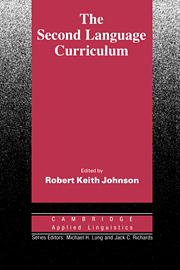Series editors' preface
Published online by Cambridge University Press: 05 October 2012
Summary
This book in the Cambridge Applied Linguistics series presents an overview of the scope and dimension of language curriculum development and also demonstrates how many of its leading practitioners apply curriculum theory and practice to language teaching. Publication of this collection of mainly original papers is a healthy sign that, in the last few years, language curriculum practitioners have moved away from a narrow view of their work, one which focused largely on issues of content and methodology, to a more comprehensive, and at the same time, complex understanding of curriculum. This is one which encompasses policy making, needs assessment, instructional design and development, teacher preparation and development, as well as programme management and evaluation. This is a far cry from the days of ‘syllabus design’.
The value of this collection of papers which Keith Johnson has assembled lies in the many different perspectives it offers on the language curriculum. Both macro and micro issues are presented, and curriculum development is seen to be a dynamic process that must be understood in its entirety if the particulars are to work with any degree of efficiency. Throughout, the emphasis is thus on systematicity and interrelatedness of elements. The message the book delivers is that if we wish to improve the effectiveness of language teaching programmes, we need to examine in more depth the hidden dimensions of language programmes. Educational institutions need to assume a greater degree of responsibility in the planning, implementation and evaluation of their own programmes and instructional materials.
- Type
- Chapter
- Information
- The Second Language Curriculum , pp. ixPublisher: Cambridge University PressPrint publication year: 1989



